Vancouver, British Columbia, July 12, 2022 – Westward Gold Inc. (CSE: WG, OTCQB: WGLIF, FSE: IM50) (“Westward” or the “Company”) is pleased to provide a further update on the Company’s inaugural drill campaign, currently underway at its flagship Toiyabe Project in Lander County, Nevada (“Toiyabe”). The ~4,000-meter program is now in its final stages, with 10 holes completed to date.
Recent Developments
Drilling at the second of four target areas – the Toiyabe Hills North Zone – was completed in the first week of July, with each of the four holes reaching a depth of 1,000 feet / ~305 meters (for additional details on the Toiyabe Hills North Zone, please refer to Westward’s press release dated June 22, 2022). The primary target was a northeast-trending structure – the Toiyabe Hills Fault (the “TH Fault”) – and drilling confirmed its presence along with several other structures across the four holes. Broad zones of decalcification (+15 meters), and intrusive rocks were encountered throughout the drilling. Surface mapping and drill cuttings have confirmed that the TH Fault was a fluid conduit based on the alteration and intrusive rocks observed.
The Company’s management and technical teams were recently on site touring the property and monitoring the campaign’s progress, and met with the drilling crew while hole T2205 was underway (see Figure 1 below). The rig is now currently drilling in the third target area, the Toiyabe-Saddle Down-dip Zone (the “TSD Zone”); the paragraphs that follow detail the rationale for Westward’s exploration targeting there and the geological theories being tested. Three of the holes in the TSD Zone have now been drilled and the rig is mobilizing to the fourth drill pad location.
Shipments of reverse-circulation chip samples have continued in regular intervals, and ALS Ltd. is now in possession of 8 total holes. The Company anticipates receiving assay results from the lab in batches, beginning before the end of August and continuing into September.
Figure 1: Toiyabe Hills North – Hole T2205 (top left - looking northeast; top right - looking southwest towards past-producing Toiyabe-Saddle Mine) & Northern Extent of Toiyabe Hills Fault (bottom - looking south)
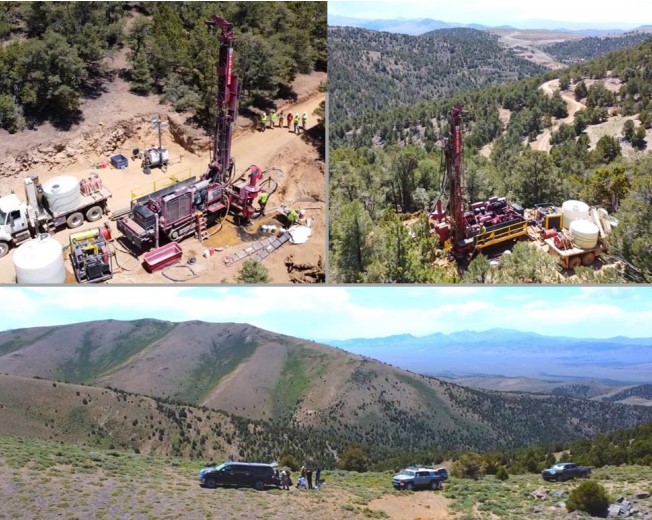
Toiyabe-Saddle Down-dip Zone
The Company’s third target area (the TSD Zone) is situated to the south of the historical resource estimate at Toiyabe (~173 koz at 1.2 g Au/t)(1) (the “Historical Estimate”), between the northernmost open pit at the past-producing Toiyabe-Saddle Mine and the Historical Estimate. Four holes are planned in the area, with one (T2208) being situated ~350 meters to the east. There is very limited prior drilling near the ~650m direct line between the Historical Estimate and open pit, and zero holes in the grey shaded box shown in Figure 2 below.
One of the main drivers of exploration targeting in the TSD Zone was testing a major deformation zone / blind thrust fault in the Wenban Formation, a favourable carbonate unit and documented gold host at the nearby Pipeline, Cortez Hills and Goldrush deposits. Data compilation and analyses by Westward over the winter months – including relogging of legacy drillholes, integration of hyperspectral core imaging, and 3D modeling – led to the identification of this deformation zone (thereafter referred to as the “SSD Zone”). Based on the available evidence, it is now believed that the SSD Zone dips from the southwest to the northeast, approaching the surface as it moves towards the past-producing mine, and deeper towards the Historical Estimate. Recent geological surface mapping has also unveiled several northeast-striking igneous dike-filled fault corridors across the property, including at the TSD Zone; these rocks are clay-altered and oxidized (see Figure 3 below for an example near the recently-completed hole T2209).
Dave Browning, Westward’s VP of Exploration, noted: “This is one of our most compelling targets, and surprisingly – given it’s on a direct line between two known deposits – one of the least-explored areas on our property. We’ve developed a new understanding of the thick deformation zone we’re testing, and these holes will be instrumental in filling in the gaps of our geological model and potentially broadening the lateral extent of mineralization at Toiyabe.”
Figure 2: 2022 Toiyabe Drilling – Toiyabe-Saddle Down-dip Zone
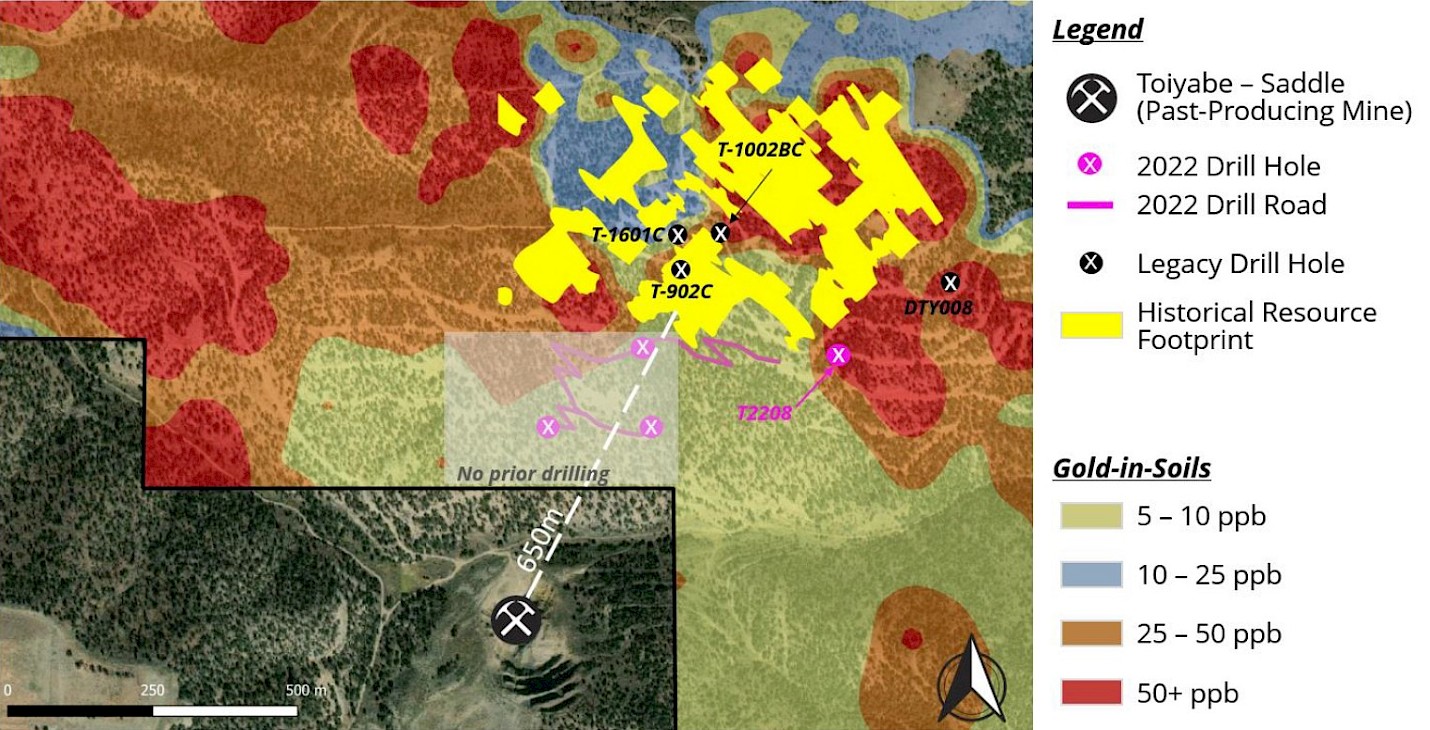
Figure 3: TSD Zone - Clay-Altered and Oxidized Igneous Rocks
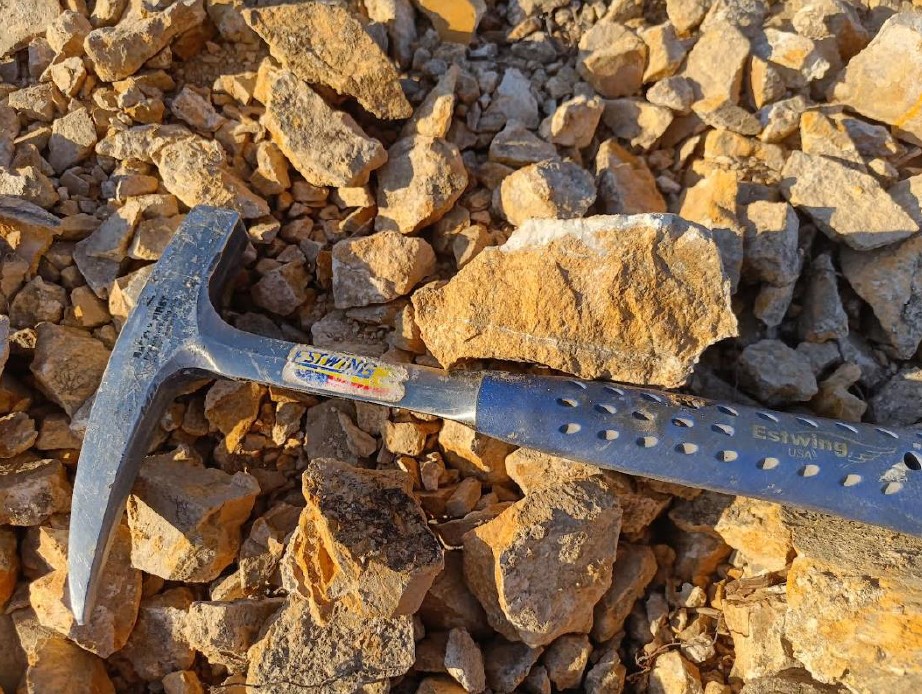
In addition to the altered igneous corridors in the area, hydrothermal calcite is also abundant in proximity to the planned TSD Zone drilling. The calcite observed was deposited via fluid transport, as opposed to being depositional; this is common in Carlin-type systems when limestone at depth is stripped of calcite by fluids (a process known as decalcification), thus creating pore space for gold. The calcite is brought up to the surface and produces distinctive banded deposits (see Figure 4 below). Decalcification has been consistently observed at depth throughout the current drill campaign.
Figure 4: TSD Zone - Hydrothermal Calcite Sample at Surface
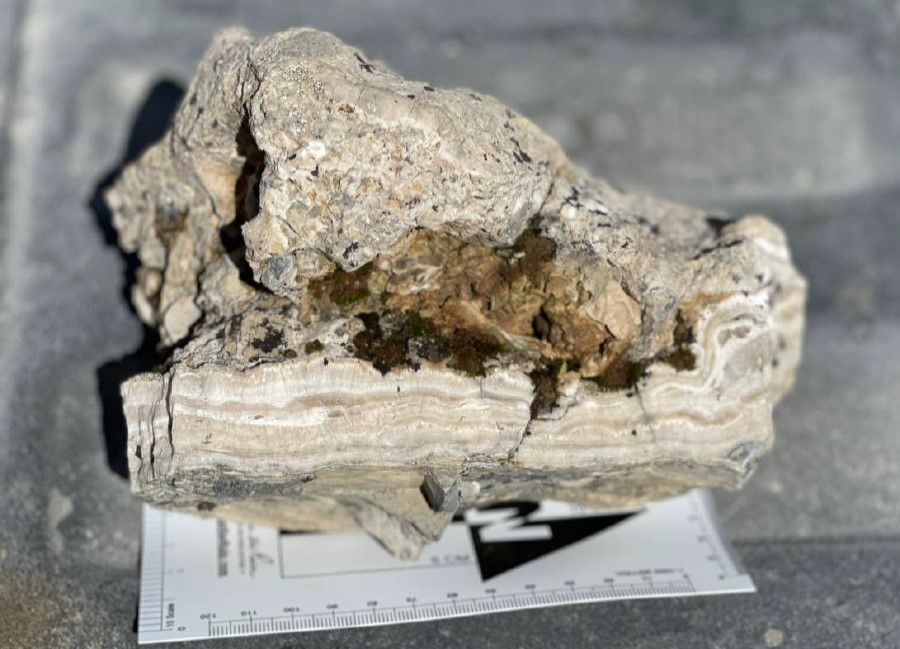
Very few holes in previous drill campaigns(2) reached a sufficient depth to properly test the SSD Zone (only 16% of all legacy holes identified on the property reached 180+ meters). Three notable holes within the footprint of the Historical Estimate intersected thick, tabular, disseminated gold developed in the SSD Zone, which occurred at a similar depth horizon indicating lateral continuity. These intervals are beneath the Historical Estimate and did not contribute to the estimated tonnage and grade at that time.
- T-902C: 42.7m @ 1.37 g Au/t (from 267m depth)
- T-1002BC: 33.8m @ 1.16 g Au/t (from 292m depth)
- T-1601C: 25.9m @ 1.01 g Au/t (from 278m depth)
Hole T2208
The first hole to be recently completed by the Company in this stage of drilling was T2208, the easternmost of the four. In the vicinity, a 100m-spaced grid was completed between 1988 and 1989, with 8 nearby holes reaching an average depth of 100m. Follow-up drilling by subsequent operators intercepted 22.9m @ 1.62 g Au/t from a depth of 104m (including 15.2m @ 2.20 g Au/t) in hole DTY008 (refer to Figure 2 above). DTY008, located approximately 175m away from Westward’s T2208, is the closest hole which tested mineralization at depth. T2208 fills in a gap in the historical grid, and is designed to test the southeast extension of the Historical Estimate as well as the deeper mineralization observed in DTY008. T2208 was also collared within a gold-in-soils anomaly which extends southeast from the Historical Estimate.
Reverse-circulation chips collected from T2208 show five distinct intervals of intrusive rocks with associated silica and breccia (see Figure 5 below). This included an interval ending at a depth of ~300 meters, deeper than in any previous drilling. In addition, zones of decalcification (varying from moderate to strong) were observed which were up to 15 meters wide.
Figure 5: T2208 - Reverse-Circulation Chips – Silica & Breccia Associated with Intrusive Rocks
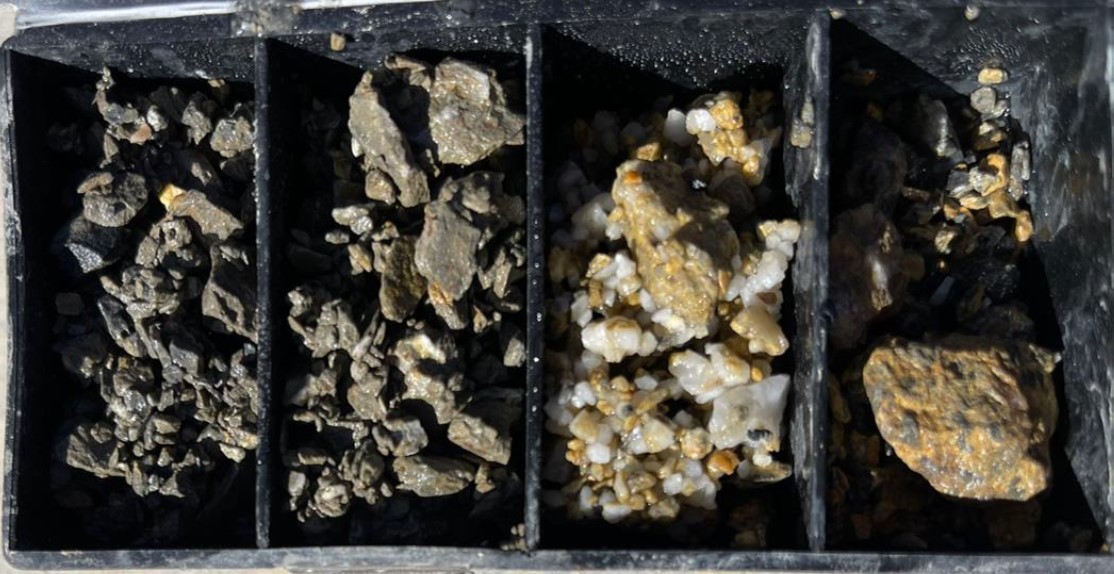
(1) Source: NI 43-101 Technical Report, American Consolidated Minerals Corporation, Prepared by Paul D. Noland, P. Geo., May 27, 2009 (the “2009 Technical Report”). A qualified person has not done sufficient work to classify the Historical Estimate at Toiyabe as current mineral resources and Westward is not treating the Historical Estimate on Toiyabe as a current mineral resource, as defined in National Instrument 43-101 – Standards of Disclosure for Mineral Projects (“NI 43-101”). The Historical Estimate was calculated using mining industry standard practices for estimating Mineral Resource and Mineral Reserves (2005) which was prior to the implementation of the current CIM standards for mineral resource estimation (as defined by the CIM Definition Standard on Mineral Resources and Ore Reserves dated May 10, 2014). The key assumptions, parameters and methods used to prepare the Historical Estimate on Toiyabe are described in the 2009 Technical Report. While Westward considers the Historical Estimate on Toiyabe disclosed in this news release to be relevant to investors, it cautions readers that it should not be unduly relied upon in drawing inferences on the mineralization on Toiyabe, as additional work is required to upgrade or verify the Historical Estimate as a current mineral resource. This additional work includes (but may not be limited to): re-sampling and re-assaying of available core and/or pulps, verification of assay certificates and digital assay data, verification of select drill hole collars, review and verification of drill hole geologic logs versus the preserved core and RC cuttings, incorporation of AuCN assays to provide a general understanding of metallurgical characteristics, review and verification of mineralization controls and modelling techniques.
(2) Sources: NI 43-101 Technical Report, IM Exploration Inc., Prepared by Donald E. Cameron, P.Geo., August 5, 2021; Toiyabe data room and drill log files inherited from previous operators. The Company and its qualified person have relied on third-party data during its review of the information presented herein, and while it believes the information to be relevant to investors, it cautions readers that it should not be unduly relied upon in drawing inferences on the mineralization at Toiyabe, as additional work is required to confirm drill intercepts and/or soil samples, including (but not limited to): re-sampling andre-assaying of available core and/or pulps, verification of assay certificates where available, review and verification of drillhole geologic logs versus the preserved core and RC cuttings.
Qualified Person
The technical information contained in this news release was reviewed and approved by Steven R. Koehler, Technical Advisor to the Company, who is a Qualified Person under National Instrument 43-101 – Standards of Disclosure for Mineral Projects. Mr. Koehler is a Certified Professional Geologist (CPG) through the American Institute of Professional Geologists (AIPG).
About Westward Gold
Westward Gold is a mineral exploration company focused on developing the Toiyabe, Turquoise Canyon, and East Saddle Projects located in the Cortez Hills area of Lander County, Nevada. From time to time, the Company may also evaluate the acquisition of other mineral exploration assets and opportunities.
For further information contact:
Colin Moore President, CEO & Director Westward Gold Inc. colin@westwardgold.com Tel: +1 (647) 403 0391
www.westwardgold.com
The Canadian Securities Exchange has neither approved nor disapproved the contents of this news release. The Canadian Securities Exchange does not accept responsibility for the adequacy or accuracy of this news release.
This news release contains or incorporates by reference “forward-looking statements” and “forward-looking information” as defined under applicable Canadian securities legislation. All statements, other than statements of historical fact, which address events, results, outcomes, or developments that the Company expects to occur are, or may be deemed, to be, forward-looking statements. Forward-looking statements are generally, but not always, identified by the use of forward-looking terminology such as "expect", "believe", "anticipate", "intend", "estimate”, “potential”, “on track”, “forecast", "budget", “target”, “outlook”, “continue”, “plan” or variations of such words and phrases and similar expressions or statements that certain actions, events or results “may”, “could”, “would”, “might” or “will” be taken, occur or be achieved or the negative connotation of such terms.
Such statements include, but may not be limited to, information as to strategy, plans or future financial or operating performance, such as the Company’s expansion plans, project timelines, expected drilling targets, and other statements that express management’s expectations or estimates of future plans and performance.
Forward-looking statements or information are subject to a variety of known and unknown risks, uncertainties and other factors that could cause actual events or results to differ from those reflected in the forward-looking statements or information, including, without limitation, the need for additional capital by the Company through financings, and the risk that such funds may not be raised; the speculative nature of exploration and the stages of the Company’s properties; the effect of changes in commodity prices; regulatory risks that development of the Company’s material properties will not be acceptable for social, environmental or other reasons, availability of equipment (including drills) and personnel to carry out work programs, that each stage of work will be completed within expected time frames, that current geological models and interpretations prove correct, the results of ongoing work programs may lead to a change of exploration priorities, and the efforts and abilities of the senior management team. This list is not exhaustive of the factors that may affect any of the Company’s forward-looking
statements or information. These and other factors may cause the Company to change its exploration and work programs, not proceed with work programs, or change the timing or order of planned work programs. Additional risk factors and details with respect to risk factors that may affect the Company’s ability to achieve the expectations set forth in the forward-looking statements contained in this news release are set out in the Company’s latest management discussion and analysis under “Risks and Uncertainties”, which is available under the Company’s SEDAR profile at www.sedar.com. Although the Company has attempted to identify important factors that could cause actual results to differ materially, there may be other factors that cause results not to be as anticipated, estimated, described or intended. Accordingly, readers should not place undue reliance on forward-looking statements or information. The Company’s forward-looking statements and information are based on the assumptions, beliefs, expectations, and opinions of management as of the date of this press release, and other than as required by applicable securities laws, the Company does not assume any obligation to update forward-looking statements and information if circumstances or management’s assumptions, beliefs, expectations or opinions should change, or changes in any other events affecting such statements or information.
